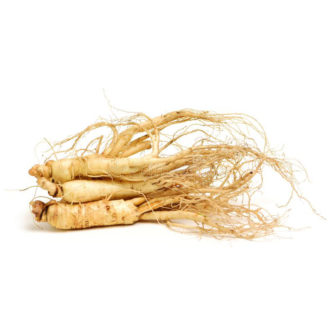Ginseng has been used in traditional Chinese medicine for centuries as a supplement for overall health and well-being. Ginseng is a general name that includes 11 different varieties but the most popular are American ginseng (Panax quinquefolius) and Asian ginseng (Panax ginseng). The roots of the short, slow-growing plant can be classified three ways, depending on how long it is grown: fresh, white or red. Fresh ginseng is harvested before 4 years, white ginseng is harvested between 4-6 years, and red ginseng is harvested after 6 or more years.
Most commonly used as an antioxidant and an anti-inflammatory, Ginseng has many uses ranging from improved brain function to a treatment for erectile dysfunction. It is known to boost the immune system, regulate blood sugar levels, and even help prevent cancer. Ginseng’s wide range of benefits make it one of the most popular and useful medicinal herbs.
Ginseng contains compounds known as ginsenosides. There are various types and species of ginseng including Panax ginseng (Asian ginseng) and Panax quinquefolius (American ginseng). Various other plants are mistaken for the ginseng root, with common examples including Siberian ginseng (Eleutherococcus senticosus) and crown prince ginseng (Pseudostellaria heterophylla). The true ginseng plants are those that belong to the Panax genus.
Ginseng roots are usually sold in the dried form as a traditional medicine that is thought to provide various benefits as an aphrodisiac, stimulant and antidiabetes agent, as well as a treatment for sexual dysfunction in males.
Ginseng may also be added to energy drinks, herbal teas, hair tonics and cosmetic products.
Ginseng Uses
- Antioxidant
- Inflammation reduction
- Improved brain function
- Erectile dysfunction
- Immune system booster
- Potential cancer risk reducer
- Increased Energy Levels
Side Effects of Ginseng
- Insomnia
- Nausea
- Hypertension
- Headaches
- Breast pain
Contraindications Related to Ginseng
Ginseng has been shown to cause adverse reactions when used alongside warfarin, phenelzine and antidepressants.
Origins of Ginseng
Asia and North America
My Favorites
- No Favorites Yet

